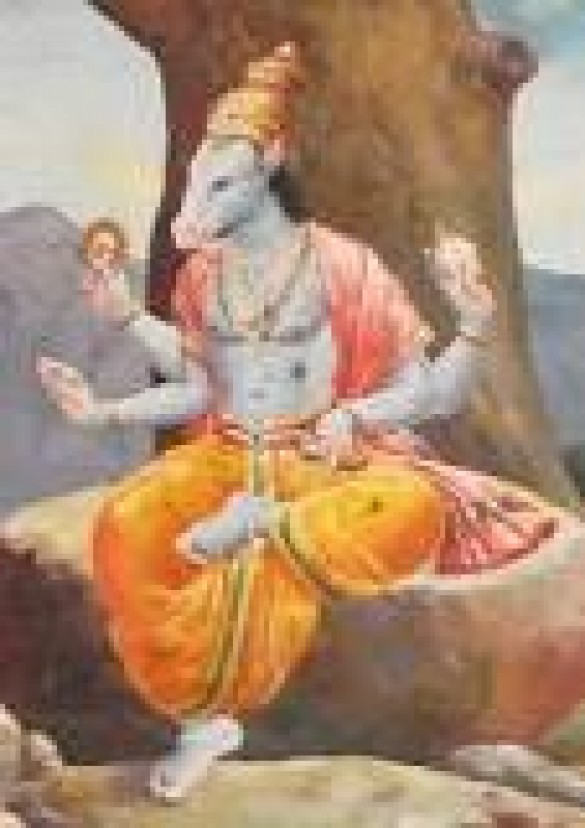
In the vast pantheon of Hindu mythology, Hayagriva stands as a unique and awe-inspiring incarnation of Lord Vishnu. Often depicted with the head of a horse and the body of a human, Hayagriva is revered as the embodiment of wisdom, knowledge, and divine learning. His captivating form and profound significance have earned him a special place in the hearts of devotees and scholars alike. The legend of Hayagriva finds its roots in ancient texts such as the Puranas and the Vishnu Purana. According to these narratives, the universe was once gripped by an overwhelming sense of darkness due to the demon brothers, Madhu and Kaitabha, who stole the sacred Vedas from Lord Brahma, the creator of the universe. With the theft of the Vedas, knowledge and wisdom were endangered, and the cosmic balance was at risk of being disrupted.
In response to this dire situation, Lord Vishnu assumed the divine form of Hayagriva to restore the Vedas and preserve knowledge for the welfare of the universe. Hayagriva's name is derived from the Sanskrit words "haya" (horse) and "griva" (neck), signifying his distinctive equine appearance. In his Hayagriva form, Vishnu is often depicted with a serene human face and a majestic horse head atop his shoulders. He is adorned with divine ornaments, and his body radiates a divine aura, symbolizing his transcendental nature. In one hand, he holds the sacred Vedas, representing the restoration of knowledge, and in another, he carries the conch shell (shankha), signifying his divine authority. Hayagriva's significance is not limited to the recovery of the Vedas; he also represents the embodiment of divine intelligence and the source of all knowledge. As the divine horse-headed deity, he personifies the pursuit of wisdom and learning, encouraging seekers to attain spiritual enlightenment through the acquisition of knowledge.
Apart from his role in the retrieval of the Vedas, Hayagriva is also associated with the preservation of the arts, sciences, and scriptures. He is considered the patron deity of education, scholars, and intellectuals, inspiring devotees to seek knowledge and wisdom in all realms of life. In the Hindu tradition, Hayagriva is particularly revered in the realm of education. Students and scholars often invoke his blessings before undertaking any academic pursuits, seeking his guidance and divine grace to excel in their studies. His blessings are believed to bestow clarity of thought, memory retention, and intellectual acumen, making him an indispensable deity for those on the quest for knowledge. Hayagriva's worship is also prevalent in other spiritual traditions, notably in Tibetan Buddhism. In the Mahayana Buddhist tradition, he is known as "Tamdrin," the wrathful aspect of Avalokiteshvara (the bodhisattva of compassion), and symbolizes the subjugation of ignorance and the attainment of wisdom. The Hayagriva Mantra, known as the "Hayagriva Gayatri Mantra," is a sacred chant used in his worship. Devotees recite this mantra to invoke his blessings and seek his divine wisdom and guidance.
In conclusion, Hayagriva stands as a divine and awe-inspiring avatar of Lord Vishnu, revered for his equine-headed form and profound significance in the realm of knowledge and wisdom. His role in restoring the Vedas and preserving knowledge underscores his status as the embodiment of divine intelligence and the source of all learning. As the patron deity of education, scholars, and intellectuals, Hayagriva's blessings inspire seekers on their quest for knowledge and spiritual enlightenment. Devotees continue to invoke his grace and seek his divine guidance, making him an eternal symbol of wisdom and the pursuit of knowledge in Hindu mythology and beyond.
Also read - Rishabha Avatar of Vishnu: The Divine Incarnation of Asceticism and Spiritual Enlightenment